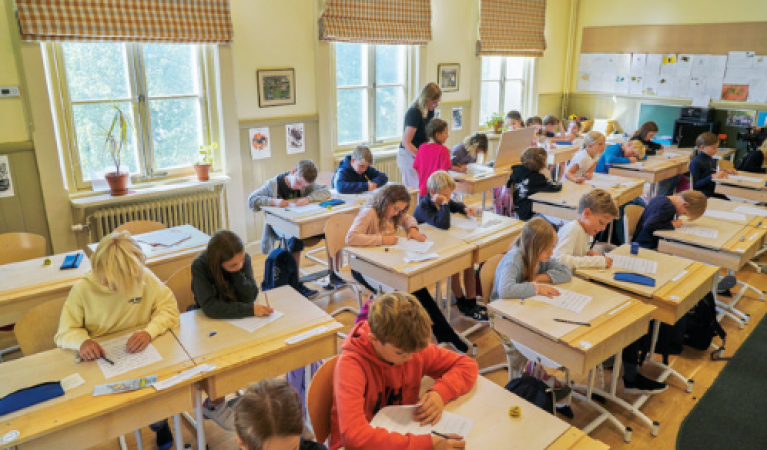
Stockholm: Sweden, long hailed for its progressive approach to education, is making a notable shift away from its heavy reliance on technology in schools.
Instead, it is placing renewed emphasis on the fundamental elements of education—books and handwriting. The Swedish government has recently unveiled ambitious plans to invest $64.7 million in book purchases for schools this year, with an additional $500 million allocated for the next two years.
This shift in educational priorities comes in response to growing concerns that Sweden's tech-centric approach has contributed to a decline in foundational skills, particularly reading and writing.
Also Read: UN Human Rights Commissioner Condemns Burning of Qur’an
A recent study has revealed that Swedish students' reading performance has experienced a notable decline in recent years, now falling below the average of their peers in other developed countries.
The Swedish government firmly believes that a return to traditional methods, such as books and handwriting, will play a pivotal role in bolstering students' literacy skills.
Books are considered a potent tool for nurturing critical thinking abilities and sparking imagination, while the practice of handwriting is believed to enhance fine motor skills and concentration.
The government's decision has garnered support from educators and parents alike, who have long expressed concerns about the overreliance on technology in the classroom.
However, some experts caution that this shift might carry unintended consequences, potentially resulting in a generation of students less comfortable with technology.
Also Read: Modi Commends Saudi Arabia's Strategic Partnership as "Historic" Route Unveiled
The effectiveness of Sweden's experiment with traditional learning methods remains to be seen. Nevertheless, this move underscores the country's commitment to addressing the challenges in its education system and its willingness to enact changes aimed at improving the quality of education for its students.
Sweden's government views this transition back to traditional educational methods as an integral part of a comprehensive education reform designed to elevate the quality of education in the country.
In addition to the renewed focus on books and handwriting, the reform includes an emphasis on personalized learning and increased investment in teacher training. The government's overarching goal is to position Sweden's education system among the world's best.
Sweden's educational landscape has been characterized by a distinctive blend of innovation, independence, and a focus on student-centered learning.
Over the years, it has been lauded as a model of progressive education. However, the recent dip in academic performance and literacy levels has prompted a reassessment of the nation's educational approach.
The decision to reintroduce books and handwriting into Swedish schools carries significant implications. It signals a reevaluation of the country's educational priorities and a willingness to make substantive changes to enhance the quality of education. It also reflects a broader global discussion about the role of technology in education.
Proponents of this shift argue that a balanced approach—one that combines technology with traditional learning methods—may offer the most effective educational experience. While technology has undoubtedly transformed education, there is recognition that it should complement, rather than supplant, essential skills like reading and writing.
The Swedish case also raises questions about the broader impact of technology on education worldwide. As technology continues to permeate classrooms globally, educators and policymakers must carefully consider how to strike the right balance between innovation and preserving foundational skills.
Also Read: Dramatic Turn of Events: Siblings of Sara Sharif Taken During Grandfather's Home Raid
In Sweden, educators, parents, and students alike will closely monitor the outcomes of this educational reform. The hope is that by embracing the value of books and the practice of handwriting, Sweden can bolster its education system, equipping its students with the essential skills they need to thrive in an increasingly complex world.
The evolving story of Sweden's education system serves as a vital case study in the ongoing quest to provide the best possible education for future generations.